UNIT1: PEOPLE AND PLACES
Key Unit Competence: To use language learnt in the context of people and places

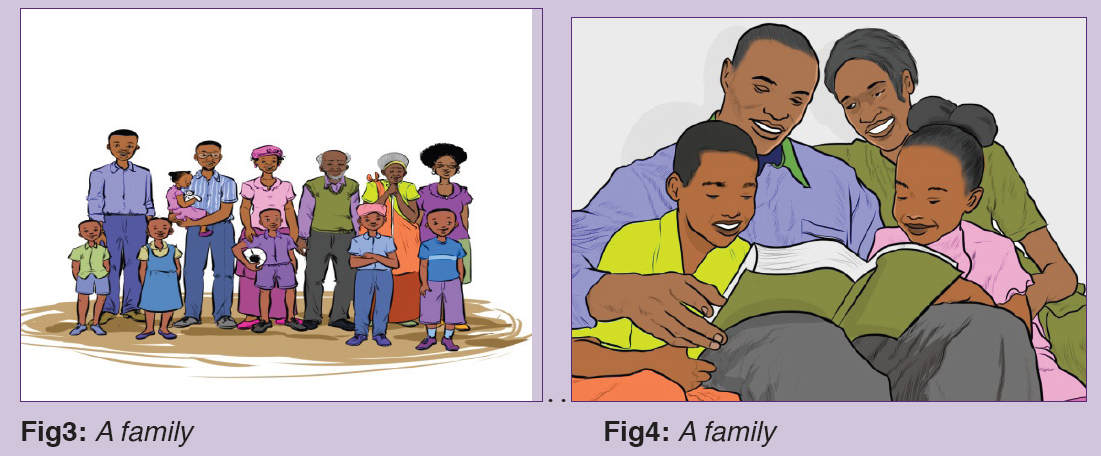
After observing the above pictures, answer the following questions.
1. Why do you think people visit national parks?
2. Describe people in your home using present simple tense.
3. Do you think people in fig 3 make a nuclear or an extended family? Explain.
4. Compare and contrast a nuclear and an extended family using conjunctions like while and whereas.
5. If you were a parent, would you spend money to take your children to explore new places? Justify your answer.
1.1. Introducing oneself and others

• Text 1. A dialogue between two classmates
Read the dialogue below and answer the questions that follow:
Keza: Hello! My name is Keza Irene. Nice to see you.
Mutoni: Hello! I am Mutoni Sara. Nice to meet you too.
Keza: When did you report for the new term and how often do you study from the library?
Mutoni: Oh well, I got to school last week and always have my preps in the library.
It’s convenient for concentration- less movement and maximum silence is maintained.
Keza: That’s great to hear. By the way, do you have any friends here?
Mutoni: Yes, I do, and I usually come with them here for preps. My best friends in this College are Mahoro Janet and Ngabire Sarah. The three of us are fascinated with quiet environments.
Keza: Obviously, but where do Janet and Sarah live?
Mutoni: Janet lives in the far end of lake Mirayi in Bugesera District.
It is a semi- arid area while Sarah is in the quiet neighbourhood of Kacyiru District.I seldom visit them.
Keza: Have you ever been to Akagera national park?
Mutoni: Yes, I have, and I must say, it is one of the richest ecological sites in Rwanda with natural vegetation, beautiful lakes and variety of animal species. It has an amazing scenery.
Keza: Oh wow! Am inspired to visit that place. Where is it located?
Mutoni: It is found in the Eastern province of Rwanda near the border with Tanzania. It would be amazing if you visited.
Keza: Thank you Mutoni, it was great meeting you and talking to you. I’m more motivated to visit new places like the Akagera National park. I’m glad I met you and hope to see you again.
• Comprehension questions
1. Are the two speakers meeting for the first time or not, explain your answer.
2. Describe Akagera national park in 4 sentences.
3. Explain why the three friends love reading from the library.
4. From the dialogue, discuss the parts of speech reflected and provide examples.
5. Discuss some of aspects that the three friends have in common in the dialogue. Give two.
6. Identify two differences between the places from which the two friends have come.
7. From the dialogue, find the contextual meaning of the following words:
a) Fascinated
b) Seldom
c) Obviously
• Text 2: Animals in the farm
Read the passage below and answer the questions that follow:
The animals never lost, not even for an instant, their sense of honour and privilege as members of Animal Farm. It remained the only farm in the whole of England, owned and operated by animals! And when they heard the gun booming and saw the green flag fluttering at the masthead, their hearts swelled with imperishable pride, and the talk turned always to the old heroic
days, the expulsion of Jones, the writing of the seven commandments, the great battles in which the human invaders had been defeated . None of their old dreams had been abandoned.
The republic of animals which Major had foretold, when the green fields of England should be destroyed by animal feet, was still believed in. It might be that their lives were hard and that not all of their hopes had been fulfilled; but they were conscious that they were not like other animals. If they went hungry it was not from feeding tyrannical human beings; if they worked hard at least it was for themselves. No creature upon them went upon two legs. No creature called any other creature Master. All animals were equal. One pleasant day, when the animals had finished work and were making their way back to the farm buildings, the terrified neighing of a horse sounded from the yard. Startled, the animals stopped in their tracks. It was Clover’s voice. She neighed again, and all the animals broke into a gallop and rushed into the yard. Then they saw what Clover had seen. It was a pig walking on its hind legs.
Yes, it was a squealer. A little awkwardly, as though not used to supporting his considerable bulk in that position, but with perfect balance, he was strolling across the yard. And a moment later, out from the door of the farmhouse came along a herd of pigs all walking on their hind legs. Some did it better than the others, one or two were even a little bit unsteady and looked as though they would have liked the support of a stick, but every one of them made his way right round the yard successfully. And finally, there was tremendous barking of dogs and a shrill crowing from the black cockerel... and out came Napoleon himself majestically upright, casting haughty glances side to side, and with his dogs gambling round him.
He carried a whip on his trotter.
There was deadly silence. Amazed, terrified, huddling together, the animals watched the long line of pigs march slowly round the yard. It was tough, the world had turned upside down. Then there came a moment when the first shock had worn off and when, despite everything, in spite of their terror of the dogs, and of the habit, developed through long years, of never complaining, never criticizing, no matter what happened. They might have uttered some words of protest. But just at that moment, as though at a signal, all the sheep burst out into a tremendous bleating of:
‘Four legs good, two legs better! Four legs good, two legs better! Four legs good, two legs better!’
It went on for five minutes without stopping. And by the time the sheep had quieted down, the chance of utter of any word of protest had passed, for the pigs had marched back into the farmhouse.
Benjamin felt a nose nuzzling at his shoulder. He looked round. It was Clover. Her old eyes looked dimmer than ever. Without saying anything,she tugged gently at his mane and led him round the end of the big barn were the seven commandments were written. For a minute or two they stood gazing at the tarred wall with its white lettering.
‘My old sight was failing, she said finally, even when I was young, I could not have read what was written there. But it appears to me now that, that wall looks different. Are the seven commandments the same as they used to be, Benjamin?’
Benjamin read out to her what was written on the wall. There was nothing there now except one single commandment. It read:
“All animals are equal but some animals are more equal than others”
Extract from “Animal Farm” by George Orwell
• Comprehension questions
1. What do you understand by the phrase,” … all animals are equal, but some animals are more equal than others.”
2. Why are animals proud of the animal farm?
3. How can you tell from the passage that Napoleon was the leader?
• Vocabulary
Construct your own sentences using the words below:
a. Bulk
b. Privilege
c. Imperishable
d. Tyrannical
e. Untrodden
f. Tugged
g. White lettering
h. Uttered

Write a two-page essay explaining the unique qualities that make people different.
1.2. Talking about people at home

• Text 1
Look at the pictures and read the passage below, then answer questions that follow.
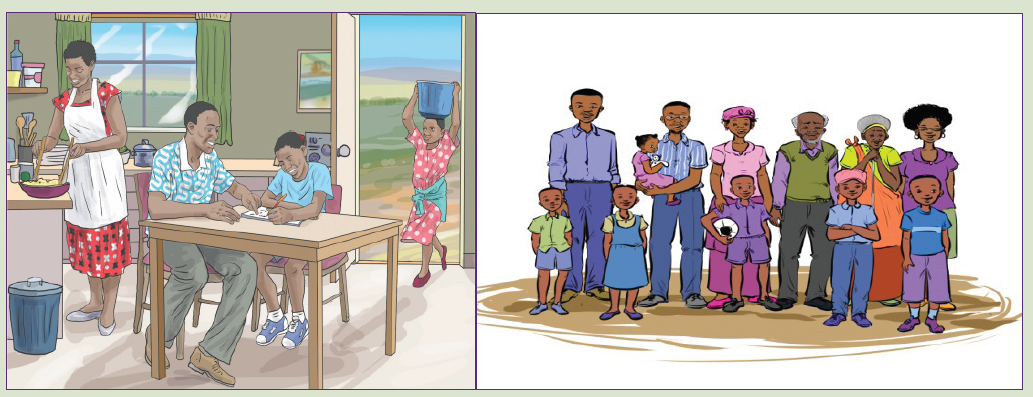
Home environment
A home is generally defined as a place where one lives permanently, especially as a member of family or household. Normally when we talk about a home, people understand a family. The family is a social group characterized by common residence, economic cooperation and reproduction. It contains adults of both sexes, at least two of whom maintain a socially approved
sexual relationship, and one or more children, own or adopted. There are two types of family that is; nuclear and extended family. The term nuclear family refers to the family group consisting of parents and children, while extended family includes all those with kinship ties. Throughout history, families have been central to human society, the basic social unit for the expression of love between man and woman and the creation and raising of children.
Although the twentieth century saw the decline in strength and numbers of the nuclear family, it has also been noted that there was never an age in history when the ideal family existed. As we move forward into an age in which barriers are broken down and we come to live together as one human family, the essential nature of individual families is key to harmonious human societies. A three generation family includes grandparents in addition to parents and children, and provides the greatest support for the raising of children and continuation of the lineage.
The term nuclear family was developed in the western world to distinguish the family group consisting of parents and their children, from what is known as extended family. So, nuclear family is made up of parents and siblings whereas extended family is composed of some people from the same ancestors. According to Merriam-Webster, the term dates back to 1947 and
is therefore relatively new, although nuclear family structures themselves are not.
As far back as our knowledge takes us, human beings have lived in families.
We know of no period where this was not so. We know of no people who have succeeded for long in dissolving the family or displacing it ... Again and again, in spite of proposals for change and actual experiments, human societies have reaffirmed their dependence on the family as the basic unit of humans living in a family of father, mother and children.
Adapted from https://www.newworldencyclopedia.org/entry/Nuclear_family
• Comprehension questions
1. In your own words define the term “family”.
2. Do you think uncles and aunts belong to nuclear or extended family?
Justify your answer.
3. Between nuclear and extended family which one do you prefer and why?
4. What do you think the writer meant by “there was never an age in history when the ideal family existed”?
5. At your place, which role does the extended family play in raising children?

1. Write a short paragraph explaining how a good family would look like. (Refer to notes on paragraph writing in unit 5, page….)
2. Discuss the following statements:
a. “ The family is a social group characterized by common residence, economic cooperation and reproduction”.
b. “It contains adults of both sexes, at least two of whom maintain a socially approved sexual relationship...”
1.3. Narrating about different places
Read the following text and answer questions that follow:
• Text: Shannon Sims’ experience in Akagera National Park
The road through Akagera National Park in eastern Rwanda was blocked.
Two giraffes had positioned themselves smack in the middle of the dirt road and were rubbing their necks together.
In the car, with a driver and a guide, my cell service was long gone; there was nothing to do but sit back, relax and enjoy the show.
Right around this time of year, to the east of Rwanda’s borders, in Tanzania and Kenya, big packs of tourists are stumbling over each other to get the perfect photo of a scene like this.
They’re driving through protected areas like Serengeti National Park and the Maasai Mara National Reserve in caravans of Land Rovers, each packed so tightly that peoples’ binocular straps get tangled up.
It makes sense: the animal migrations that occur in this part of the world these months are rightly considered by many to be the greatest natural show on earth.
But in Akagera, an eight- hour day in the park concluded without the sighting of another tourist. I did, though, see those necking giraffes, as well as plenty of snorting rhinos, which brilliantly hued birds and lumbered elephants.
Ms. Hall’s mission is to bring Akagera back to life. An electric fence put up around the park to keep poachers away is monitored by a canine unit and 80 rangers. Rangers also work on building back trust with the local community.
For lodging, the park contains one flavorless hotel, Akagera Game Lodge, with a baboon problem. I spilled my coffee in fright when a surprise guest jumped onto my balcony ... A better choice could have been Rusizi Tented
Lodge, run by African Parks.
The showcase is a crescent-shaped patio built out over the edge of Lake Ihema, which happens to be a popular hang spot for a pack of hippopotamus.
While guests nibble on pastries and fruit in the morning, the hippos heave into each other in the water, occasionally smashing their tusks together to create a startling clacking sound in early morning tussles.
Headed north from Ruzizi, an Akagera game drive is also a five to seven- hour highlight reel of gorgeous east African landscapes: open plains, scraggly highlands and the swampy waters of Africa’s largest protected wetlands.
At the north end of the park, the Karenge Bush Camp brings lucky visitors into even closer, more rustic proximity with Akagera’s natural surroundings.
Adapted from https://taarifa.rw/2018/09/23/akagera-game-park-is-asuccess-story-in-the-making/
• Comprehension questions
1. Do you think that Sims was bored when their car was blocked by two giraffes? Explain.
2. Describe what happens around this time of year, to the east of Rwanda’s borders.
3. Do you think Akagera National Park received many tourists at this time? Justify your answer.
4. Discuss the measure that has been put in place to protect the park from poachers?
5. What do you understand by “tourists are stumbling over each other to get the perfect photo of a scene like this”?
Vocabulary activity: Using dictionary and thesaurus
Find the meaning of the following words as they are used in the above passage. (the words are highlighted in the text)
1. Smack
2. Stumbling
3. Caravans
4. Snorting
5. Brilliantly
6. Poachers
7. Spilled
8. Balcony
9. Rustic
10. Startling
11. Reel
12. Hang spot
13. Wetland
14. Scraggly

Use each of the above words in your own sentence.
1.4. Comparing people according to their gender and occupations

• Text1: Gender differences in occupation of employment
Read the passage below and answer the questions that follow:
Differences in employment distributions between women and men have been, and continue to be, a prominent feature of the labour market. Researches indicated a high degree of difference that remained fairly constant from the
early 1900s until about 1970.
The 1970s were a watershed period in occupational desegregation, as indicated by significant declines in measures of occupational differences.
The advances of the women’s movement, the enactment of laws prohibiting sex discrimination, increases in female enrolment in higher education and professional schools, the steady increase in women’s participation in labour force, and reductions in gender stereotyping in both education and employment all contributed to this trend. Women continued to make inroads
into male dominated occupations in the 1980s, although the pace of change slowed.
The degree to which the jobs that women and men hold differ, reflecting a number of factors including: the amount and types of education that workers have completed; the types of jobs that have expanded or declined; personal preferences; societal attitudes about gender roles, which can affect both the kind of work that men and women choose and how family responsibilities enter into work decisions; and, in some cases, discrimination. Data that are available for broad occupational groups for the past two decades clearly indicate two major points. First, the gender distribution of many occupations
has shifted substantially. Second, despite these shifts, women and men still tend to be concentrated in different occupations: women are highly overrepresented in clerical and services occupations, for example, while men are disproportionately employed in craft, operator, and labourer jobs.
Women generally have moved most rapidly into those occupational groups in which employment has been expanding over the past two decades.
This is not surprising; because there is a greater demand for workers in faster growing occupations, so that growth could lower barriers to entry, such as gender discrimination. During 1975 to 1995, overall job growth was fastest among managers and professionals and slowest among machine operators, helpers and labourers, and farming occupations. Over this period,
women increased their representation significantly among managerial and professional specialty occupations: in 1995, women accounted for 43 percent of managerial and related employment, nearly double their share in 1975 (22 percent); and women’s share of employment in professional occupations also rose over this period, from 45 percent to 53 percent. By contrast, women made few gains in employment share among a number of occupations that posted little or even negative growth during this period. For example, among operators, fabricators, and labourers, women’s share of employment remained unchanged between 1975 and 1995, at 24 percent.
Currently, women and men are most equally represented among managers and professionals; in 1995, women held about half of such jobs. Employment of technicians and sales occupations also was about evenly split between women and men. Gender differences were still pronounced, however, among workers in other major occupational groups. For example, women held 4 out
of 5 administrative support jobs. Women also were represented heavily in services occupations, particularly private household occupations (in which they account for 96 percent of employment) and service occupations, except private household and protective services (65 percent). Men, by comparison, were much more likely than women to work in the precision production,
craft, and repair occupational group—which includes construction trades, holding 9 out of 10 such jobs in 1995. Men also continued to account for the large majority of employment in protective service (84 percent); farming, forestry, and fishing (80 percent); and operating, fabricating, and labouring occupations (76 percent).
Written by Barbara H. Wootton(1997)
• Comprehension question
1. Describe the distribution of job occupations between men and women from the early 1900s to 1970.
2. State five factors/elements that contributed to the trend of watershed period in occupational desegregation in 1970s.
3. Using an example explain how societal attitudes about gender roles can affect people’s careers.
4. The gender distribution of many occupations has shifted substantially but still women and men still tend to be concentrated in different occupations. What do you think causes this?
5. Why is the writer not surprised to see women moving most rapidly into new occupational groups (craft, operator)?
6. Explain how the distribution of jobs between men and women was in 1995, as far as employment of technicians and sales occupations is concerned.
Vocabulary
Use a dictionary and thesaurus to look up the missing meanings of the
words/phrases in the table below. Copy the table into your book and fill in
the blank spaces.
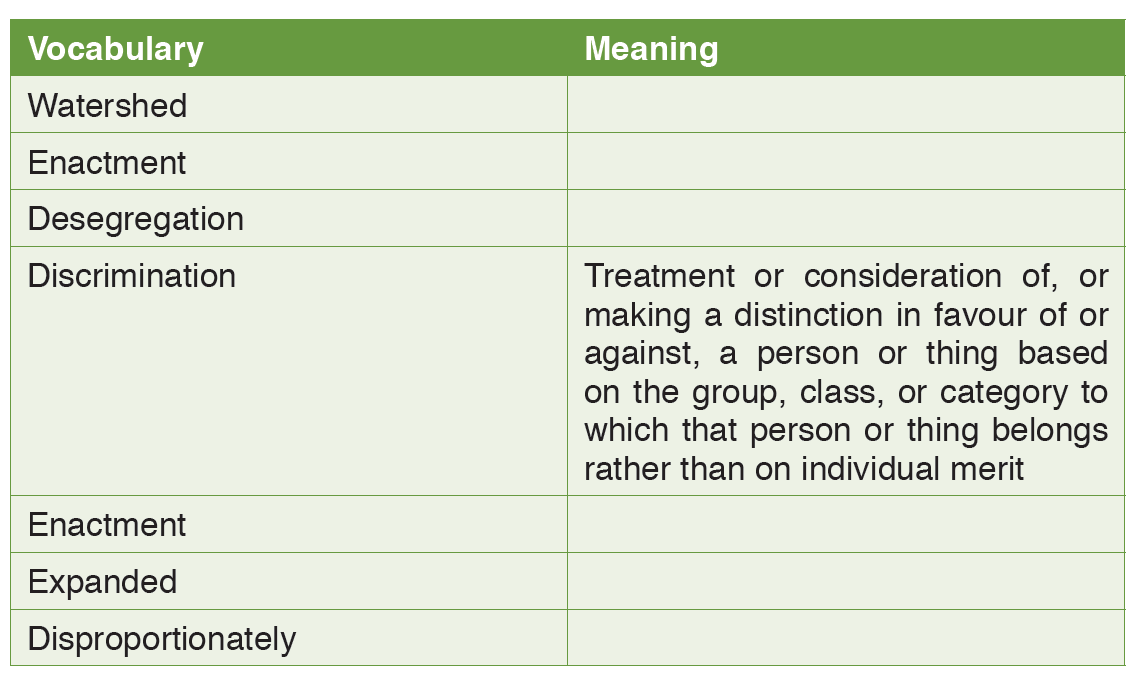

Write a 200word composition explaining how societal attitudes about gender roles can affect people’s occupational employment.
Text2: Rwanda’s first female commercial pilot
Read the following passage and answer questions that follow
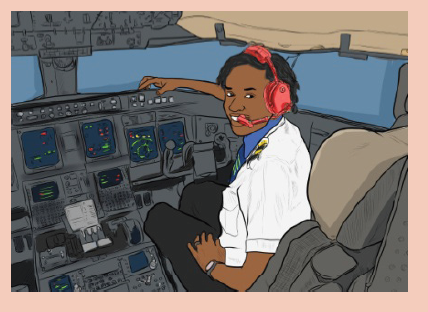
During her childhood, Esther’s family would move on a regular basis due to her father’s work as a pastor. But her desire to take to the skies never wavered, even after her father passed away in a plane crash in the Democratic Republic of Congo, when the passenger aircraft he was travelling on overshot the runway and hit some terrain.
When Esther Mbabazi was 5, she looked up and watched an aeroplane cut across the sky. She thought to herself, “I want to be the one flying that plane.”
The fact that there were no female pilots in her native country Rwanda—and never had been before— didn’t affect her vision.
“You know what? I’m going to fly,” she said, “and that’s what motivated me my entire life, that idea I had as a young child.”
At 24, Esther became the first female commercial pilot in Rwanda. It shocked a lot of people because her father died in a plane crash when she was a young girl. But Esther refused to be deterred from her dream.
“I love the adventure,” she says. “Every day is different. I would wake up today and even though I’m going to the same destination I was going to yesterday, something is going to be different. That’s what I enjoy about my job: Every day brings its own uniqueness.”
Esther refuses to believe that being a woman negatively affects her career.
“It’s a modern world. I have no fear of heights and I like machinery,” she says, refusing to bow to the stereotypes about women that she’s come across.
But she has experienced some negative response. One day, a male was the one flying, he wouldn’t stay on the plane.
“I feel like even though there’s just that one person, there’s a thousand more that are excited and are happy about where the world is going for women,” she says.
Esther’s achievement is remarkable, but being a woman in a traditionally male-dominated field isn’t anomaly in Rwanda.
“Of course, I’m sure everyone knows we have the highest number of women in the parliament in the world,” Esther says, citing Rwanda’s remarkable achievement in gender parity. Half of Rwanda’s Supreme Court is also women, and an equal number of boys and girls attend school in the country.
“You know a lot of leadership roles are taken by women in Rwanda,”
Esther says. “I think Rwanda is doing really a good job training women and supporting women in all aspects.”
Today, she gets dozens of letters from young girls who want to be pilots someday. “Everything starts with a dream,” she says, and encourages those young girls to study math and ignore the naysayers. She also asks them to think about what will come between them and their dream—and then she encourages them to completely ignore it.
“If they are girls, people will tell them “Oh, if you’re a pilot, it will be hard for you to have a family, to find a husband,” Esther says. “But those opinions don’t really matter.”
“Overall, it’s a job that requires passion. Whether you’re a man or a woman, you just have to have passion.”
Adapted from https://www.one.org/international/blog/meet-esther-the-firstfemale-commercial-pilot-in-rwanda/
• Comprehension questions
1. Why were people astonished to see Esther becoming a pilot?
2. What makes her enjoy her job?
3. What is Esther’s position as far as sex discrimination in job occupations is concerned?
4. Using an example from the passage, explain how there are still negative societal attitudes towards job distribution between men and women.
5. Which advice does Esther give to young girls who want to be pilots someday?
Vocabulary
Use a dictionary and thesaurus to look up the missing meanings of the words/phrases in the table below. Copy the table into your book and fill in the blank spaces.
1.5. Language structure
A. Present simple tense
Present simple tense, also known as simple present tense or present indefinite tense is used to describe an action that is regular, true and normal.
It could equally be used to describe what is happening currently.
Present simple tense can be used for the following:
1. Repeated actions
2. Examples:
• She drinks water twice a day.
• The train leaves for Nairobi once a month.
• He visits her aunt twice a week.
• They eat meat with rice once week.
3. Habits,
• They regularly swim in the evening.
• I usually get up early every day.
4. Things that are generally true.
• They speak Ikinyarwanda at home.
• It shines a lot in summer.
5. Facts
• They come from Rwanda.
• Birds have wings.
6. Something fixed in the future.
• The school choir leaves at 7:00pm in the evening.
• She performs her traditional song tomorrow morning.
7. Some time to talk about past actions when we are summarising a book, film or play
Example:
Okwonko is moved although he remains unstoppable with his mission to become the Lord of his clan. He is disappointed by Nwoye but maintains great love for his daughter Ezinma, his child by his second wife Ekwefi.
Ekwefi has begotten ten children but only Ezinma has survived. He loves the girl so much…
Extract from Things Fall Apart by Chinua Achebe
The table below shows how the simple present tense can be used.

Rules:
• We use do/does for questions in the present simple and we specifically employ does for the third person singular.
• For third person singular, (she, he, it) we add ‘s’ to the verb.
• Often, adverbs of frequency such as sometimes, usually, seldom etc. are used with the present simple.
• We also use do/does to make interrogative clauses and negative sentences in the present simple.
• Do and does can be used with some of the ‘WH’ words such as where, when, what. Example, when does Nzeyi clean his room?
However, who does not use do or does as seen in the example below: Who lives in Huye?
Exercises
1. Construct (10) grammatically well-structured sentences using the present simple tense.
2. Narrate an experience you encountered at college using the present simple tense.
B. Past Simple tense
The past tense is formed by adding ‘ed’ at the end of the verb. This is very applicable for only regular verbs in their pat form. Such verbs in their base include play, laugh, clean, pray etc. while the irregular verbs like Catch, sweep, bring, carry have no defined formula to include for their past form.
• Uses of the past tense:
To talk about something that happened once in the past
Examples:
1. We met at the market last evening.
2. We carried the books back to the library yesterday.
When talking about a thing that happened several times in the past
Examples:
1. We sang a lot while we were in school.
2. They always enjoyed playing the piano.
For expressions with ago, we also use simple past
Examples:
1. I reintegrated my family twenty years ago.
2. Kevin finished his assignment two days ago.
When something was true for some time in the past
Examples:
1. She prayed a lot when she was sick.
2. I worked in Rwanda for fifteen years.
Examples of verbs with their past form.
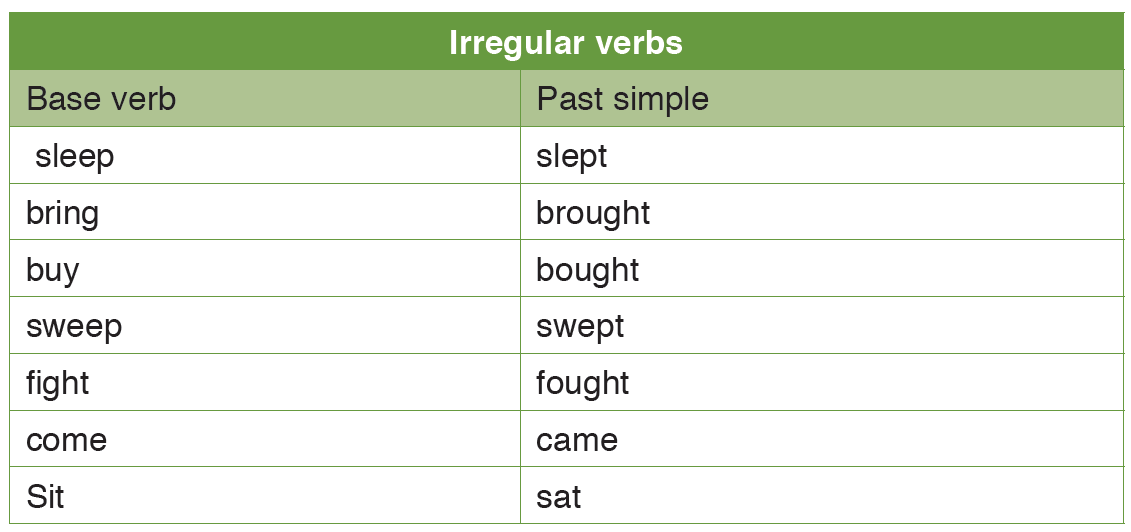
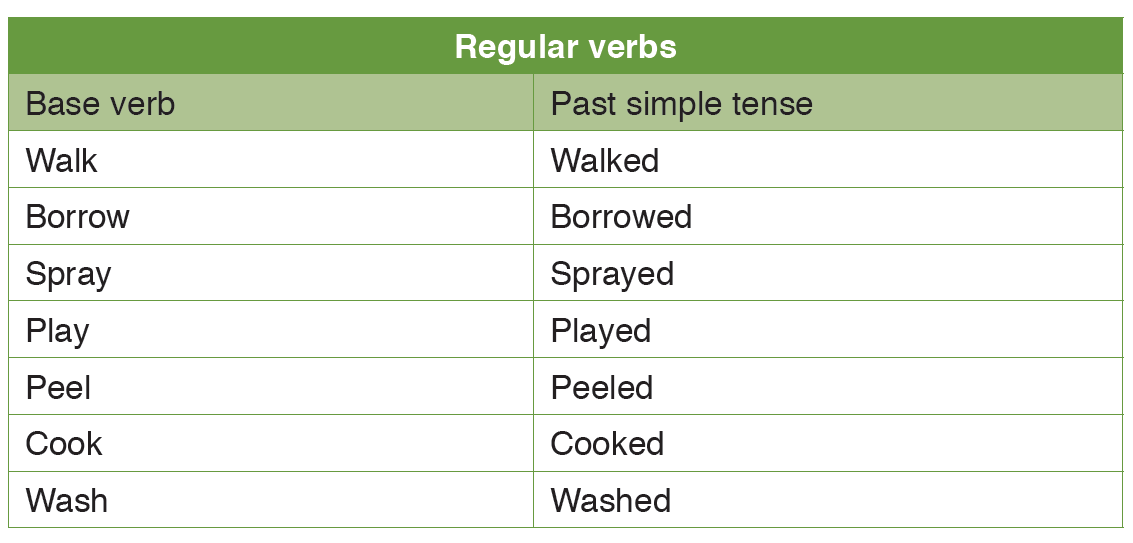
C. Nouns: Proper nouns, Common nouns, Collective nouns,
Abstract nouns Countable and uncountable nouns
• Definition
A noun can simply be defined as a word that names a person, place, thing or an idea. There are different types of nouns, but our focus will be on proper, common, abstract, collective also known as mass nouns, countable or uncountable nouns.
Abstract nouns: These are nouns that denote ideas, qualities or state rather than concrete objects.
Examples of abstract nouns can be qualities such as politeness, intelligence etc.
Collective nouns: They are words that are used to name a group of things, persons, or animals. Examples include a flock of sheep, a gang of thugs, a crowd of people, a fleet of trucks, a herd of cattle etc.
Common noun: It is a word used to name general things, places, ideas, events, or people. Common nouns are also termed as general nouns and do not provide a specific name.
Example: a table, a desk, a class, a black or white board.
• Proper noun: Is the name of a particular person, place, organization or thing. Proper names begin with capital letters when written. We also use capital letters for festivals such as Easter, Christmas, Iddi etc.
• Countable and uncountable nouns: Countable nouns are words used to name things or persons that can be counted for example bottles, books, cups, girls, boys while uncountable nouns are for things, animals or persons that cannot be counted. Examples include Air, sand, wind, crowd, etc.
D. Pronouns: Personal, indefinite, demonstrative, relative, reflexive, reciprocal and possessive pronouns , interrogative
pronouns. Pronouns are words that replace nouns in sentences. We normally use pronouns to limit repetition of nouns that have been used in sentences.
The types of pronouns include, personal, indefinite, demonstrative, relative, reflexive, reciprocal and possessive pronouns. In this unit, only personal, possessive and demonstrative pronouns are described.
1. Personal pronouns can be subjects or objects in sentences.
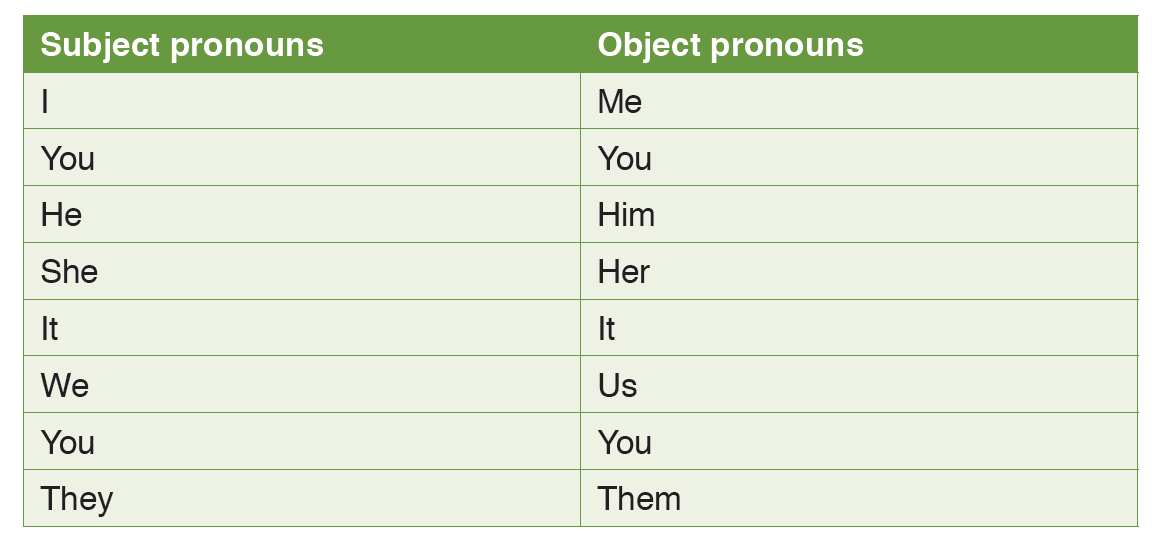
2. Possessive pronouns
Possessive pronouns are words that indicate ownership or possession in a
sentence. These pronouns show that something belongs to someone.
Examples include, my, our, theirs, his, hers, mine, yours.
3. Demonstrative pronouns.
These are pronouns that are used to directly point at something specific within a sentence. These pronouns are very few but are extremely relevant in language. Examples include; such, this, that, these, none, neither and those.
This is used with nouns in singular.
These is a plural form of ‘this.’ These is used with nouns in plural.
That is used with nouns in singular.
Those is the plural form of that and is used with nouns in plural.
Examples
1. This is my book.
2. Are these books yours?
3. That book is not mine.
4. Those books are John’s.
Exercise
Fill in the blanks with; this, these, that, those
1. …....... is Robert.
2. …….. pencils are mine.
3. Put …… chairs into the corner.
4. Is ……… your house?
5. Are ……… computers broken?
6. ……….. girl in front of the cinema hall is my sister.
E. Articles: Indefinite articles, Definite articles
An article is a word that accompanies a noun to specify its grammatical definiteness. Articles include: a, an and the. They can be definite or indefinite.
Indefinite articles
Indefinite articles are; a and an. They are used in several ways:
1. We use the indefinite articles (a and an) when we refer to any person or thing and not a particular one. For example
a. She gave me a radio.
b. Kamali is afraid to use an escalator.
• Note
The words “radio” and “ escalator” in the examples above are referring not to particular but to general items.
2. We also use indefinite articles when we mention something for the first time.
Example: A farmer approached an officer with a petition.
The farmer felt a bit scared because he did not know how the officer would react to the petition.
3. We use the indefinite article an when the word that follows it begins with a vowel sound. A is used when the word that follows it begins with a consonant sound. Look at the examples below.
a. Her fiancé gave her a ring.
b. The girl gave an answer.
c. I prefer working in a university.
Definite articles.
The definite article the is used to refer to particular things or persons. It is used in the following ways:
1. It can be used with both singular and plural nouns, unlike the indefinite articles.
2. It is used when we mention something that we had mentioned before.
Example: A farmer approached an officer with a petition. The farmer felt a bit scared because he did not know how the officer would react to the petition.
3. We don’t put an article before the name of a country unless it starts with united, for example, the United States of America or the United Kingdom; or its name contains the word Republic or Union, for example, the People’s Republic of China.
4. When referring to languages, we use the in the following ways: we say the English language and not English language; We say fluent in English and not fluent in the English
F. Conjunctions: Whereas, While, When, Where
In the text above you must have come across the sentences below. Read them carefully and explain the role of the highlighted words.
1. A home is generally defined as a place where one lives permanently
2. The term nuclear family refers to the family group consisting of parents and children, while extended family includes all those with kinship ties.
3. Nuclear family is composed of parents and siblings, whereas extended family is made up of all people from the same ancestors.
• Notes:
A conjunction is a part of speech that is used to connect words, phrases, clauses, or sentences. Conjunctions are considered to be invariable grammar particles. Below are some conjunctions that are used to contrast two similar things.
a) Whereas
Whereas is a conjunction which is used to highlight an important difference between two similar things or facts.
When whereas comes at the beginning of a subordinate (dependent) clause, we put a comma before it.
Examples
1. Nuclear family is composed of parents and siblings, whereas extended family is made up of all people from the same ancestors.
2. The term nuclear family refers to the family group consisting of parents and children, whereas extended family includes all those with kinship ties
3. People say ‘fries’ in America, whereas in Britain they call them ‹chips›
N.B.
When the clause with whereas comes before the main clause, we put a comma after that main clause.
Examples:
1. Whereas extended family is made up of all people from the same ancestors, Nuclear family is composed of parents and siblings.
2. Whereas Bugesera has very hot summers, Musanze summers are sometimes quite cold.
3. Whereas street children don’t get affection, children in families get enough care.
b) While
While can be used instead of whereas
Examples
1. Nuclear family is composed of parents and siblings, whereas/while extended family is made up of all people from the same ancestors.
2. Children in orphanages are sometimes sad, whereas/while children in families are usually happy.
While can also be used to express time. In that case it introduces a time clause and means “at the same time” or “during the time”.
Examples
1. While the kids were having a nap, the mom could have a relaxing bath.
2. I remembered I had forgotten to buy food while I was just leaving the market.
c) When
When can be used in different ways, but when it is used as a conjunction it means at the time that. The clause with when is a subordinate clause (sc) and needs a main clause (mc) to complete its meaning.
If the when clause comes before the main clause, we use a comma. When can be used to talk about the past, present or future as explained below.
Talking about the past
Examples:
1. When I was younger, there were no houses here.
2. Nobody spoke when she came into the room.
Talking about the present
Examples:
1. When a new child is born, there is a lot of joy in family.
2. There is a lot of joy in family when a new child is born.
Talking about the future
• Notes:
In references to the future with when, we use the present simple or the
present perfect in the when clause, not the future with shall and will:
Examples:
1. When the new park opens, my father will take me there.
Not: When the new park will open, my father will take me there.
2. When I’ve finished my homework, I’m going to phone my dad.
Not: When I’ll finish my homework, I’m going to phone my dad.
We can also use when to mean “considering that”.
Example:
What’s the point in going out when we have to be home by eleven o’clock?
d) Where
Where is used as a conjunction to mean ‘in the place that’ or ‘in situations that’. The clause with where is a subordinate clause and needs a main clause to complete its meaning. If the “where clause” comes before the main clause, we use a comma.
Examples:
1. Where you find a lot of water, you will also find these beautiful insects.
2. Where you have to pay a deposit, be sure to get a receipt.
Exercises
Using conjunctions and articles in sentences
i. Choose the right words from the brackets to fill in gaps in each of the sentences below.
1. Kariza, will you lay the table……. I help your sister with her maths exercise, please. (whereas/while)
2. The twins are very different: Kalisa is shy and reserved……. Kamana is outgoing. (whereas/while)
3. My aunt Sophie is a doctor……………. Uncle Pete is a dentist. (whereas/where)
4. I remembered my keys……………. I had left. (while/when)
5. Dad would like to have a holiday in Spain………. Mom would prefer Italy. (whereas/when)
6. Why carrying bed covers in Musanze…………… we have to sleep in a hotel. (where/when)
7. A home is generally defined as a place……………. one lives permanently. (where/when)
8. When my mother ……………… I will tell her that you didn’t mop your room. (comes, will come)
ii. Use a, an or the to fill the blanks in the following sentences. The first one has been done for you.
1. My mother considered it an hour to receive the reward promised by the President.
2. Your car is very nice. Does it have ---------DVD player?
3. Kamali rested at home in --------------garden-------------whole meaning.
4. Kalisa found --------cat. --------- cat belongs to his neighbour.
5. Keza has got -------job in ---------bank in Kigali.
6. She is --------useful person most of -------time.
Vocabulary: Word and Sentence Formation
Notes
Vocabulary is the basis for the development of all the other skills: reading comprehension, listening comprehension, speaking, writing, spelling and pronunciation. This is the main tool that helps in the use of English effectively.
Exercises
1. Copy words in column A in your exercise book and match them with their meanings in column B.
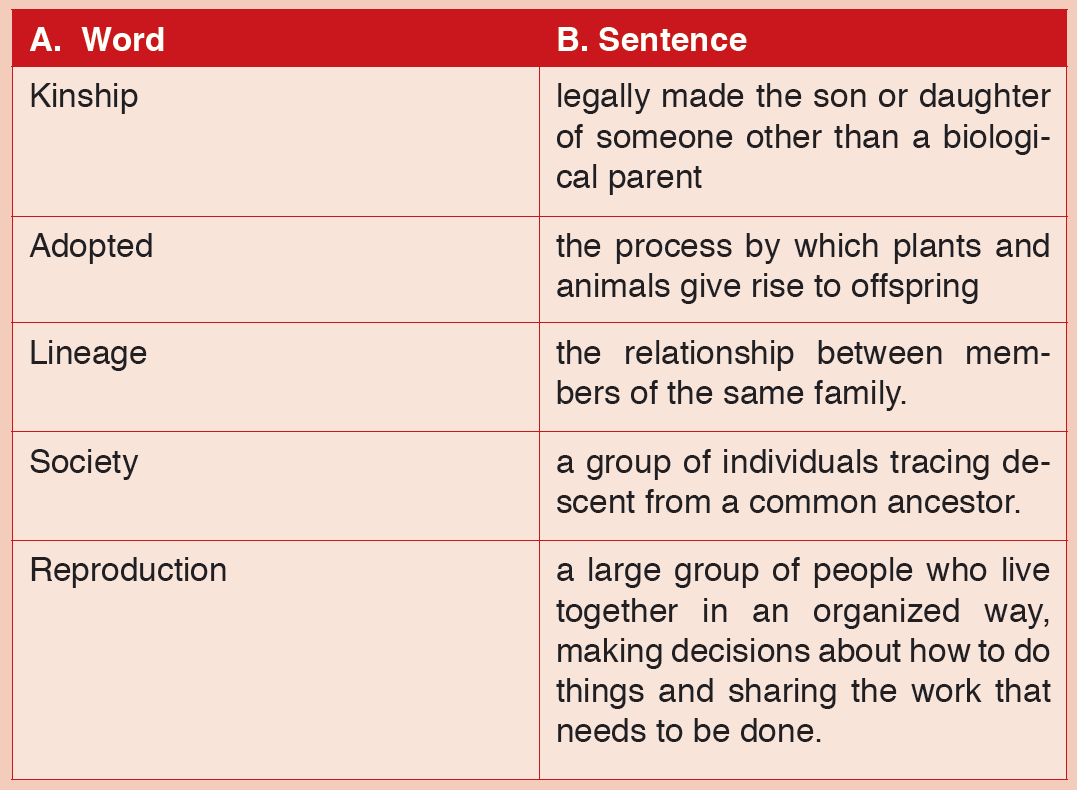
2. Use each of the words above in your own sentence.
I . Complete the sentences with the correct form of the verbs in brackets.
1. Kamali and Kalisa often……. to parties yesterday. (go)
2. Jenny sometimes …………Monica. (meet)
3. In summer, children usually…………… in the garden. (play)
4. Kalisa …………… the board every day. (clean)
5. My sister…………… blue eyes. (have)
6. Bill…………. the window at night for it is always hot here. (open)
7. They all………………. dark blue pullovers when it is cold. (wear)
8. He always……………. the housework himself. (do)
9. My mum……………. shopping every Friday. (go)
10. I never……………TV in the morning. (watch)
11. Fred…………. football last week. (play)
12. Hannah and Betty often…………… pizza. (eat)
13. Frank ………. Watching TV. (like)
ii. Decide whether to use a, an, or the for each of the following sentences.
1. _____ flowers he gave me are beautiful.
2. Her dad sings her _____ song each night before she goes to bed.
3. Have you ever eaten _____ raw egg before?
4. Excuse me, do you have _____ time?
5. He had _____ exciting day today.
6. Bob forgot to bring _____ cake he baked.
7. Can you please return _____ records you borrowed?
8. Fred met _____ wonderful group of people last night.
9. _____ people Scott met were also nice. Tell me _____ story!
iii. Write a 100-word composition explaining why living in a family is better than living in an orphanage.
